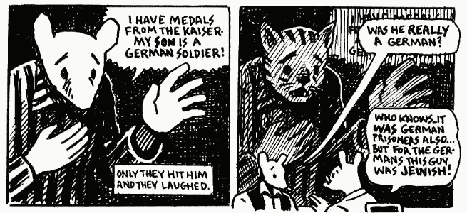I kept hearing good things about a graphic novel called Maus, by Art Spiegelman, and it always slipped my mind to read it. Thankfully, this class reminded me of Maus once again, and I finally got around to reading it! Well, all I can say now is that I am really grateful for the experience, and Maus is very well deserving of its praise.
Maus is a pivotal work that not only highlighted the struggles of the Jews during the Holocaust, but also showed the negative mental implications among the survivors long after the WW2 was over. Maus stood out because it neither tried to sugar-coat the tragedies of war, nor glorify the survivors of the Holocaust. As we can see, though Vladek was extremely resourceful and resilient, the major reason for his survival was through bribery and trickery. He bribed people with food or gold, and tricked his way through his temporary jobs as a shoe-repairer and tin-worker. In addition, Art didn't paint a very favorable depiction of Vladek even after the war was over, showing him to be anal retentive, racist, and stingy. But not all is lost here, as Vladek clearly cherished his son, Art, and still treasured Anja (albeit at the expense of Mala's sanity). In short, Art was not trying to say that his father survived the Holocaust because he was a good person. Yes, Vladek was very intelligent and strong, but he also had many flaws. He debunked many people's belief that only truly good people that deserve it survive the war. Nobody really knows.
What I appreciate about Maus is how it lets the readers be their own judge when it comes to deciding who is right or wrong. Although our impression will undoubtedly be affected by Art's portrayal of the characters as different animals (that Art admittedly, was pretty confused about), the effect is counter-balanced by how similar their bodies are. All of them have human bodies, roughly similar in size. Though the Germans looked more menacing, they did not tower over the Jews too much (this contrasts with how many artists tend to depict the bad guys as very large beings, physically). Art did not force his opinions; he tries to be as objective as possible by carefully stating the facts. And this allows us to reflect and connect with the story on a deeper level without being influenced too much by the narrator's personal opinions.

And that brings me to the next point: Art's choice of simplifying his drawing actually enhanced the readers' relationship with the characters. The art at a glance, looks minimalist and cute (I really, really think that the mouse and dog characters look adorable!) (Okay, maybe not everything in this book is cute, such as the scenes depicting massacre). Most of the time, the characters' faces were depicted with mere dots for the eyes, and simple mouths (The mouse characters don't even have mouths!) Yet, their emotions are clear and resonated with me. This reminds me of what McCloud said in his book "Understanding Comics" about simple looking characters. The simpler the characters are, the easier it is for the readers to relate and project themselves into the characters. That is probably why I felt Anja's despair as her face contorted in pain upon realizing that everyone from her family died. The same can be said when they were smiling with their eyes. I also believe that the simplified art made it more accessible to wider age range of audience. The book deals with very heavy subject matter about mass murder, cruelty and racism, and the approachable art helps acts as a balance. (This reminded me of how Persepolis presented heavy and sensitive topics through simplified art too).
Lastly, I learned in class that Maus was one of the first few graphic novels that was widely acclaimed and accepted by the academics. It proved that comics are for adults too, and really, any kind of stories can be told in that form. Growing up reading manga (many are obviously not kiddie friendly), I always found the misconception about comics being only for kids to be flabbergasting and downright sad. As such, I am grateful of Maus' widespread success (despite the artist's guilt about reaping success from the sacrifice of the millions of Holocaust victims) and hope to see more comic books/ graphic novels/ mangas in the schools' reading list and treated with less prejudice.
No comments:
Post a Comment